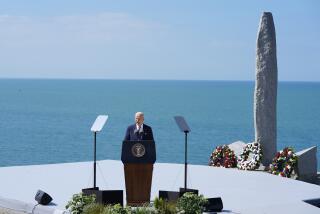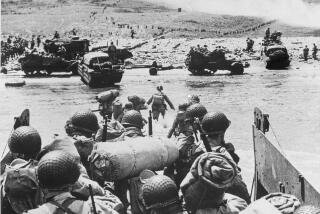In the Trenches With WWII Troops
- Share via
The historian Stephen E. Ambrose wears his uncomplicated heart on his sleeve.
“In four decades of teaching,” he has written, “I’ve always found that what the students want, first of all, is: Who were our heroes? What did they do? . . . So my approach to war and politics has been biographical.”
So it is with “Citizen Soldiers,” a lively account of the Allied liberation of Northern Europe. Ambrose has previously written books about big men in American history: Gen. (and President) Dwight D. Eisenhower, President Richard M. Nixon, Meriwether Lewis, Crazy Horse and Gen. George Armstrong Custer.
Some big men are present in this book, notably Eisenhower, Gen. George Patton and Field Marshal Bernard Law Montgomery. But, mostly, the book is about those whom Ambrose calls the “citizen soldiers,” “the junior officers and enlisted men--who they were, how they fought, why they fought, what they endured, how they triumphed.”
Ambrose is captivated by his subject. He writes that when he was growing up in Wisconsin, he lived next to a boarding house inhabited by veterans going to college on the GI Bill. When he was 12, they took him on a deer hunt, and he listened to their war stories.
“I thought then that these guys were giants. I still do,” Ambrose writes. And this book describes those ordinary Americans who became giants and won against Nazi Germany.
Ambrose never served in the armed forces and has never seen combat, so the book has a certain air of boyish enthusiasm unblemished by haunting personal memories. He tries hard to imagine what war is like, however, and does a pretty good job. His story relies on oral history, memoirs and personal interviews, and he weaves together the recollections of those who fought into a fast-paced tale of the European aspect of that enormous war.
Ambrose holds to the widely accepted view that men fight mostly for their buddies and their units, like 12-man platoons. Yet he argues that in World War II men also fought, no less than soldiers in the Civil War, for abstract ideals.
“Although the GIs were and are embarrassed to talk or write about the cause they fought for in marked contrast to their great-grandfathers who fought in the Civil War,” he writes, “they were the children of democracy and did more to help spread democracy around the world than any other generation in history.”
The story of the invasion of Normandy and the Allied breakout toward Paris has been so often told--once by Ambrose--that this book understandably adds little. But, beginning with Part II, “At the German Border,” Ambrose takes the reader into the horrors of the Hurtgen Forest, and then to Hitler’s frightening and unexpected counterattack in the Battle of the Bulge and the grim fighting in the Ardennes. It is here that “Citizen Soldiers” leaps to life. Ambrose is unsparing of those commanders from Eisenhower on down who pressed their subordinates to urge the men forward without knowing what lay ahead.
“It was only on rare occasions,” Ambrose writes, “that any officer above the rank of captain was seen by the men.” And, he angrily and accurately observes, “[t]his was inexcusable.”
He calls the decision to attack through the sopping cave-like Hurtgen Forest along the German-Belgian border a “grossly, even criminally stupid” act that pointlessly killed thousands of young Americans and Germans.
Ambrose’s account of the courage and suffering of American soldiers is sobering. The conclusion of the book is a paean to them and to their brothers: “At the core, the American citizen soldiers knew the difference between right and wrong, and they didn’t want to live in a world in which wrong prevailed. So they fought, and won, and we all of us, living and yet to be born, must be forever profoundly grateful.”
More to Read
Sign up for our Book Club newsletter
Get the latest news, events and more from the Los Angeles Times Book Club, and help us get L.A. reading and talking.
You may occasionally receive promotional content from the Los Angeles Times.









